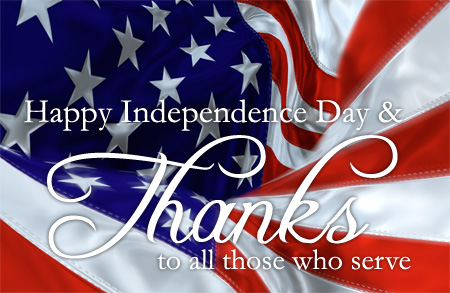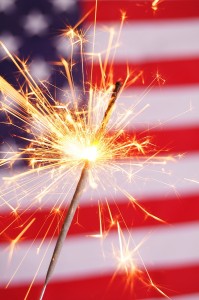 We found an awesome article with information regarding the 4th of July, and we thought we would share it with you – for the full article click here –
We found an awesome article with information regarding the 4th of July, and we thought we would share it with you – for the full article click here –The Fourth of July is only a day away. Fireworks, picnics, ice cream and get togethers with family and friends seem to be the recipe for this Summer time celebration. Though the Fourth of July brings great fun; according to the Consumer Product Safety Commission, 60 percent of all fireworks injuries occur around July 4. Firecrackers, aerials, and homemade explosives cause the most deaths and injuries.
The National Fire Protection Association reported that firework injury was highest for children ages 5-19 and adult’s 25-44, with 26 percent of the victims of fireworks injuries in 2011 being under age 15. This being said, what can you do to prevent accidents and injuries while using fireworks? The safest way to ensure fireworks safety is to attend an organized fireworks display being offered in your area. Leave the fireworks to trained professionals!
If you do decide to purchase legal fireworks, you are urged to take these safety steps provided by the Consumer Product Safety Commission.

•Make sure the fireworks you want to buy are legal in your area before buying or using
them.
them.
•Never allow young children to play with or ignite fireworks, including sparklers. Parents may not realize that young children suffer injuries from sparklers. Sparklers burn at temperatures of about 2,000 degrees – hot enough to melt some metals.
•Always have an adult closely supervise fireworks activities if older children are allowed to handle devices.
•Avoid buying fireworks that are packaged in brown paper, because this is often a sign that the fireworks were made for professional displays and could pose a danger to consumers.
 •Never place any part of your body directly over a fireworks device when lighting the fuse. Back up to a safe distance immediately after lighting fireworks.
•Never place any part of your body directly over a fireworks device when lighting the fuse. Back up to a safe distance immediately after lighting fireworks.•Keep a bucket of water or a garden hose handy in case of fire or other mishap.
•Never try to relight or handle malfunctioning fireworks. Soak them with water and throw them away.
•Never point or throw fireworks at another person.
•Light fireworks one at a time, then move back quickly.
•Never carry fireworks in a pocket or shoot them off in metal or glass containers.
•After fireworks complete their burning, douse the spent device with plenty of water from a bucket or hose before discarding the device to prevent a trash fire.